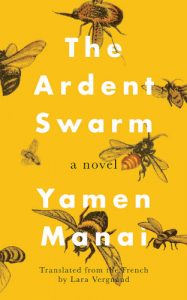The JRB presents an excerpt from The Ardent Swarm, the third novel from award-winning Tunisian author Yamen Manai, but the first to be translated into English.

The Ardent Swarm
Yamen Manai (trans. Lara Vergnaud)
Amazon Crossing, 2021
Read the excerpt:
Everyone knew that Sidi would give his life for his girls, and do so without the slightest hesitation. His love was such that he was capable of anything. Hadn’t he devoted his life to them, building them citadel upon citadel? Hadn’t he confronted a Numidian bear just to bring them the most beautiful flowers? Hadn’t he defied princes and renounced love to dedicate himself entirely to them? And so, when news that many of them had died under troubling circumstances spread from mouth to mouth, a reaction seemed inevitable.
Sidi didn’t like to make a show of his problems. He was fairly taciturn by nature, and if the news had circulated through the village of Nawa, it was because, that same morning, little Béchir had been running through the fields as he often did in the early days of spring. When he approached Sidi’s colonies, set up on the hill that had the most flowers, he saw the old man on his knees, sobbing before countless mutilated bodies, as the rest of his girls flew around him, as if to console him. Little Béchir was only a child and didn’t think to hold his tongue. And so, one hour later, all of Nawa was aware of the tragedy, and all of Nawa was outraged, especially as nobody knew Sidi, much less his girls, to have any enemies. Granted, he was an odd character and could lose his temper at times, but everyone liked him and held him in high esteem. The incident was therefore a complete mystery.
But that didn’t stop people from talking about it, which is what they did all day long, recalling seasons past and bemoaning a world going downhill.
‘It happened in the middle of the day,’ maintained Bicha, the hairdresser.
‘They were disemboweled, cut in half,’ lamented Kheira, the village grocer, to Baya, who had come to buy some sugar.
When the village elders were questioned, they went even further. ‘This is clearly the sign of a curse.’
But the collective narrative built around little Béchir’s account was merely a stopgap. Everyone was anxious to see Sidi and hear his version of events and his likely conclusions.
As night fell, the fading light outlined Sidi’s erect silhouette along the walls of the village. He walked up the narrow alleyways with determination until he reached the terrace of the café where the village men puffed themselves up with hookah smoke and endless conversation. His entrance provoked such silence that nothing could be heard apart from a breeze whistling through the leaves outside and moths repeatedly colliding into the oil lamps. He stopped abruptly and for a moment pondered the compassion-filled faces looking back at him. He continued to his regular table; the voices followed.
‘We know what happened. How terrible!’
‘All our condolences!’
Sidi nodded soberly in response and pulled out a chair. People had flocked behind him as he walked, and by the time he sat down, he had an entire crowd before him, hanging on his every word.
‘How do you all know?’
‘Little Béchir.’
‘Ah, little Béchir, okay. Louz, what are you waiting for? A Turkish coffee, please.’
The waiter replied in a lilting voice, ‘Right away, and with a dash of orange blossom! But don’t say anything until I get back.’
The gathering held out until the steaming cup was placed before Sidi.
‘When did it happen?’ asked Louz.
‘A little before noon,’ said Sidi.
‘What happened?’
‘I don’t have the slightest idea. But it wasn’t the work of any man or animal from around here,’ he replied, eliminating any worries in that respect and closing the subject.
The villagers sighed. Some brought up the end of the world while others invoked God’s mercy, then, gradually, everyone returned to their seats as games of scopa resumed to the rhythm of hookah pipes and interminable debates. That’s how evenings in Nawa went.
- Yamen Manai was born in 1980 in Tunis and currently lives in Paris. Both a writer and an engineer, Manai explores the intersections of past and present, and tradition and technology, in his prose. In The Ardent Swarm (originally published as L’Amas ardent), his first book to be translated into English, he celebrates Tunisia’s rich oral culture, a tradition abounding in wry, often fatalistic humour. He has published three novels with the Tunisia-based Elyzad Editions—a deliberate choice to ensure that his books are accessible to Tunisian readers: La marche de l’incertitude (2010), awarded Tunisia’s prestigious Prix Comar d’Or; La sérénade d’Ibrahim Santos (2011); and L’Amas ardent (2017), which earned both the Prix Comar d’Or and the Prix des Cinq Continents, a literary prize recognizing exceptional Francophone literature.
- Lara Vergnaud is a literary translator whose translations include Ahmed Bouanani’s The Hospital (New Directions, 2018) and Zahia Rahmani’s France, Story of a Childhood (Yale University Press, 2016), as well as works by Mohamed Leftah, Joy Sorman, and Scholastique Mukasonga, among others. Lara is the recipient of two PEN/Heim Translation Grants and a French Voices Grand Prize and has been nominated for the National Translation Award.
~~~
Publisher information
‘Rich with apicultural detail, wry humour, and compelling characters, The Ardent Swarm is a memorable and significant novel.’—PEN/Heim
Winner of the Prix Comar d’Or, Prix des Cinq Continents, Grand prix du roman métisse, Prix ADELF (Association des écrivains de langue française) and the Prix Lorientales.
From an award-winning Tunisian author comes a stirring allegory about a country in the aftermath of revolution and the power of a single quest.
Sidi lives a hermetic life as a bee whisperer, tending to his beloved ‘girls’ on the outskirts of the desolate North African village of Nawa. He wakes one morning to find that something has attacked one of his beehives, brutally killing every inhabitant. Heartbroken, he soon learns that a mysterious swarm of vicious hornets committed the mass murder—but where did they come from, and how can he stop them? If he is going to unravel this mystery and save his bees from annihilation, Sidi must venture out into the village and then brave the big city and beyond in search of answers.
Along the way, he discovers a country and a people turned upside down by their new post-Arab Spring reality as Islamic fundamentalists seek to influence votes any way they can on the eve of the country’s first democratic elections. To succeed in his quest, and find a glimmer of hope to protect all that he holds dear, Sidi will have to look further than he ever imagined.
In this brilliantly accessible modern-day parable, Yamen Manai uses a masterful blend of humour and drama to reveal what happens in a country shaken by revolutionary change after the world stops watching.






One thought on “[Fiction Issue] ‘That’s how evenings in Nawa went.’—Read an excerpt from The Ardent Swarm, the English debut from award-winning author Yamen Manai”